The KEMRI-NUTIM Team
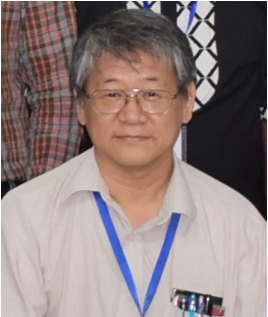
Academic/Professional Qualifications
Virologist
Mainly Zoonosis, Arbovirus diseases Research
Selected Publications
- Inziani M, Adungo F, Awando J, Kihoro R, Inoue S, Morita K, Obimbo E, Onyango F, Mwau M. Seroprevalence of yellow fever, dengue, West Nile and chikungunya viruses in children in Teso South Sub-County, Western Kenya. Int J Infect Dis. 91:104-110. (2020), Epub 2019 Nov 8.(View)
- Yu F, Adungo F, Konongoi SL, Inoue S, Sang R, Ashur S, Kwallah AO, Uchida L, Buerano CC, Mwau M, Zha Y, Nie Y, Morita K Comparison of enzyme-linked immunosorbent assay systems using rift valley fever virus nucleocapsid protein and inactivated virus as antigens. Virol J. 15(1):178. (2018), (View)
- Inoue S*, Approaches of the JICA-AMED SATREPS project to controlling outbreaks of yellow fever and Rift valley fever in Kenya. Journal of Disaster Research, 13(4), pp1-5, (2018), (View)
- Adungo F, Yu F, Kamau D, Inoue S, Hayasaka D, Posadas HG, Sang R, Mwau M, Morita K, Development and Characterization of monoclonal antibodies to yellow fever virus and their application in antigen detection and IgM capture ELISA. Clinical and Vaccine Immunology, on line 15 June 2016.1-38 (2016), (View)
- Inoue, S, Bundi M, Miring’u G, Muriithi B, Ashur S, Wandera E, Kathiiko C, Odoyo E, Kwallah AO, Galata A, Huka S, Shah M, Karama M, Kariuki S, Ichinose Y, Evaluation of a BSL-3 laboratory biosafety training program in Kenya. Journal of Biotechnology and Biosafety, 3(4): 288-296, (2015) (View)
- Wasonga C, Inoue S, Rumberia, C, Michuki, G, Kimotho JH, Ongus J, Sang R, Musila L, Genetic divergence of chikungunya virus plaque variants from the Comoros Island (2005). Virus Genes, 51(3): 323-328 ((Published online: 07 September 2015) (2015), (View)

Dr. Ernest Wandera Apondi
Research Scientist
Dr. Ernest Wandera Apondi is a Research Scientist at Nagasaki University Institute of Tropical Medicine-Kenya Medical Research Institute, Kenya. He holds a PhD in Medical Science (Tropical and Emerging Communicable Diseases) from Nagasaki University, Japan and a Postdoctoral Fellowship in Pathogen Point-of-Care Diagnostics from Mount Kenya University and the University of Hull, UK.
His research career of more than eleven years is driven by a strong desire to apply basic and clinical research knowledge in the development, implementation and evaluation of high-impact and cost-effective public health intervention tools such as vaccines, drugs and diagnostics to prevent and control infectious diseases.
His early research involved determining the burden and molecular epidemiology of diarrheal pathogens in Kenya with a special focus on rotavirus in order to guide an informed and evidence-based decision about introducing rotavirus vaccines into the country. Following rotavirus vaccine introduction, he has carried out impact assessment of the vaccine whose findings provide compelling evidence of the public health benefits of the vaccine in Kenya. Besides these, he has conducted studies exploring novel approaches to disease diagnosis. These include a novel immunosensor based on the principle of photon burst counting technique to the detection of rotavirus in clinical specimens; a novel rapid and sensitive sub-micron particle detection systems-based on the principle of metal mesh to detect and quantify diarrhea-causing pathogens in the environmental water and air; and a low-cost microfluidic point-of-care diagnostic device for fast and accurate detection of pathogens in pregnant women in low-resource settings that is based on Immiscible Filtration Assisted by Surface Tension (IFAST) and Adenosine Triphosphate (ATP) Bioluminescence Assay. This innovation won the Newton Prize 2020.
Currently, Dr. Wandera is evaluating the impact of improved integrated approach of water, hygiene and sanitation, health, nutrition and early childhood development on the health and well-being of mothers and children in a resource-constrained region of Kenya. He has begun research aimed at developing a COVID-19 lateral flow antigen (LFA) test to better inform clinical and public health interventions. Additionally, he conducts Biosafety Level III laboratory training for scientists researching on Covid-19 and other emerging infectious diseases in Kenya.
Dr. Wandera has authored several publications in peer reviewed journals and presented his research work in various international and local conferences.
Academic & Professional Qualifications
2018-2019: Post-Doctorate Research Fellow (Pathogen Point-of-Care Diagnostics). Mount Kenya University & University of Hull, UK.
2013-2017: PhD in Medical Science (Tropical and Emerging Communicable Diseases), Nagasaki University, Japan.
2009-2012: Master of Science (Biotechnology), Kenyatta University, Kenya.
2004-2008: Bachelor of Science (Biotechnology)-First Class Honours, Kenyatta University, Kenya.
Academic & Professional Qualifications
- Wandera EA, Hatazawa R, Tsutsui N, Kurokawa N, Kathiiko C, Mumo M, Waithira E, Wachira M, Mwaura B, Nyangao J, Khamadi SA, Njau J, Fukuda S, Murata T, Taniguchi K, Ichinose Y, Kaneko S and Komoto S. Genomic characterization of an African G4P[6] human rotavirus strain isolated from a diarrheic child in Kenya: Evidence for porcine-to-human interspecies transmission and reassortment. Infection, Genetics and Evolution. 2021 (in press).
- Ngamsom B, Wandera EA, Iles A, Kimani R, Muregi F, Gitaka J, Pamme N. Rapid detection of Group B Streptococcus (GBS) from artificial urine samples based on IFAST and ATP bioluminescence assay: from development to practical challenges during protocol testing in Kenya. Analyst. 2019;144(23):6889-6897.
- Wandera EA, Komoto S, Mohammad S, Bundi M, Nyangao J, Galata A, Kathiiko C, Odoyo E, Guyo S, Miring’u G, Taniguchi K and Ichinose Y. Genomic characterization of uncommon human G3P[6] rotavirus strains that have emerged in Kenya after rotavirus vaccine introduction, and prevaccine human G8P[4] rotavirus strains. Infection, Genetics and Evolution. 2019; 68:231–248.
- Wandera EA, Mohammad S, Bundi M, Nyangao J, Galata A, Kathiiko C, Odoyo E, Guyo S, Miring’u G, Komoto S and Ichinose Y. Impact of rotavirus vaccination on rotavirus hospitalization rates among a resource-limited rural population in Mbita, Western Kenya. Tropical Medicine & International Health. 2018. DOI:10.1111/tmi.13040.
- Muriithi BK, Miring’u G, Bundi M, Wandera EA, Galata A, Kathiiko C, Odoyo E, Kamemba M, Amukoye E, Huqa S, Shah M, Inoue S, Ichinose Y. Biosafety and biosecurity capacity building: insights from implementation of the NUITM-KEMRI training model. Trop Med Health. 2018. DOI : 10.1186/s41182-018-0108-7
- Hasegawa M, Wandera EA, Inoue Y, Kimura N, Sasaki R, Mizukami T, Shah M, Shirai N, Takei O, Shindo H and Ichinose Y. Detection of rotavirus in clinical specimens using an immunosensor prototype based on the photon burst counting technique. Biomed Opt Express. 2017; 8(7):3383-3394.
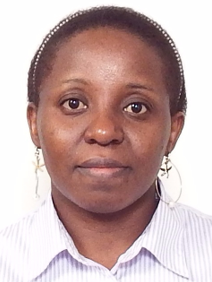
Dr. Juliann Nzembi Makau, PhD
Research Scientist
Dr. Makau is currently a research scientist at CVR with a research interest in antiviral drug research and development, drug resistance, and the development of diagnostic assays. As a principal investigator, Dr. Makau has received research grants for the following projects;
- Determination of HIV-1 drug resistance among patients failing second-line treatment in Kenya using an in-house phenotypic assay. Funded by the European and Developing Countries Clinical Trials Partnership (2020-2023).
- Pinto beans as a functional food for influenza prevention. Funded by Takano Life Science Research Foundation (2019-2020).
She is also a co-investigator in other projects on repurposing clinically approved drugs for COVID-19 and establishing a diagnostic assay for the surveillance of prion diseases in Kenya. Dr. Makau is a visiting researcher at Nagasaki University and has ongoing research collaborations with research institutions in Japan, Indonesia, Netherlands, and Italy.
Before joining CVR, she was a postdoctoral researcher and a research consultant at Nagasaki University in Japan and Nagasaki University Institute of Tropical Medicine, Kenya Station, respectively. She has published more than 10 publications in international peer-reviewed journals in the fields of computer-aided drug design & discovery, antimicrobial drug resistance, drug discovery from natural products, and the design and development of diagnostic probes. In addition, her work has been presented in both local and international scientific conferences and workshops.
Academic & Professional Qualifications
Dr. Makau holds a PhD in Medical Sciences (2017) and a MSc in Pharmaceutical Sciences (2013) from Nagasaki University in Japan, and a BSc in Medical Laboratory Science (2011) from Kenyatta University.
She holds certificates and professional training in the following;
- Diploma in Research and Development of Products to Meet Public Health Needs. Nagasaki University, Japan
- Certificate of training in high throughput screening practices in drug discovery research. Texas A&M University, Houston, Texas, USA
- Certificate in biosafety level-3 laboratory training. NUITM-KEMRI project
- Training in next-generation sequencing. NUITM-KEMRI project
- Certificate of training on the Logical Framework Approach. Global Link Management. Inc and Nagasaki University
- Corporate governance training. Centre for Corporate Governance and KEMRI
Selected Publications
- Juliann Nzembi Makau, Ken Watanabe, Hiroki Otaki, Satoshi Mizuta, Takeshi Ishikawa, Yuji O. Kamatari, Noriyuki Nishida. A quinolinone compound inhibiting the oligomerization of nucleoprotein of influenza A virus prevents the selection of escape mutants. Viruses. 2020; 12(3):E337. (View Publication)
- Juliann Nzembi Makau, Ayako Kitagawa, Kanami Kitamura, Tomoko Yamaguchi, Satoshi Mizuta. Design and development of an HBT-based ratiometric fluorescent probe to monitor stress-induced premature senescence. ACS Omega, 2020;5(20):11299-11307. (View Publication)
- Makoto Sumiyoshi, Taiga Miyazaki, Juliann Nzembi Makau, Satoshi Mizuta, Yoshimasa Tanaka, Takeshi Ishikawa, Koichi Makimura, Tatsuro Hirayama, Takahiro Takazono, Tomomi Saijo, Shintaro Shimamura, Kazuko Yamamoto, Yoshifumi Imamura, Koichi Izumikawa, Katsunori Yanagihara, Shigeru Kohno, Hiroshi Mukae Novel and potent antimicrobial effects of caspofungin on drug-resistant Candida and bacteria. Scientific Reports. 2020;10(1):17745. (View Publication)
- Ratika Rahmasari, Heri Setiawan, Rezi Riadhi Syahdi, Ayun Arifianti, Marina Ika Irianti, Rani Sauriasari, Juliann Nzembi Makau, Muhareva Raekiansyah. SARS-CoV-2: Virology and Drug Repurposing Approaches. Pharmaceutical Sciences & Research. 2020;7 (Special Issue on COVID-19):29-38. (View Publication)
- Satoshi Mizuta, Juliann Nzembi Makau, Ayako Kitagawa, Kanami Kitamura, Hiroki Otaki, Kodai Nishi, Ken Watanabe. Synthesis of trifluoromethyl-α,β-unsaturated lactones and pyrazolinones and discovery of influenza virus polymerase inhibitors. ChemMedChem. 2018; 13(22):2390-2399. (View Publication)
- Juliann Nzembi Makau, Ken Watanabe, Takeshi Ishikawa, Satoshi Mizuta, Tsuyoshi Hamada, Nobuyuki Kobayashi, Noriyuki Nishida. Identification of small molecules inhibitors of influenza A virus using in silico and in vitro PLoS One. 2017; 12(3):e0173582. (View Publication)
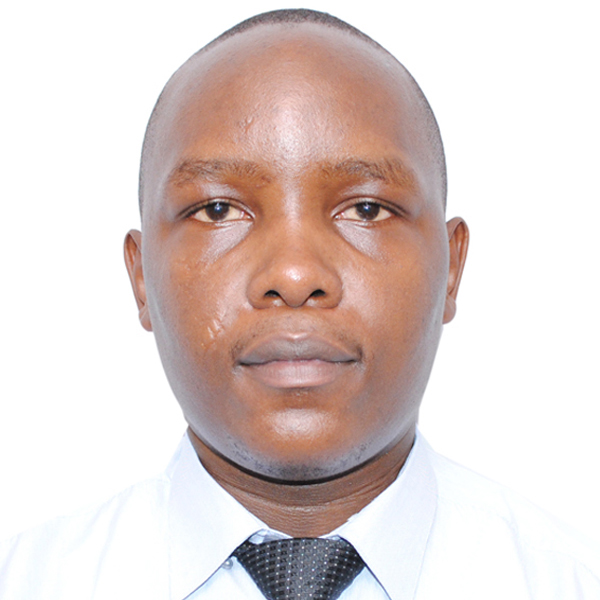
Dr. Martin Bundi
Research Scientist
Dr. Bundi is currently an Assistant Principal Research Scientist at the Centre for Microbiology Research, Kenya Medical Research Institute (KEMRI) and is seconded to the Nagasaki University Institute of Tropical Medicine, Kenya research station (NUITM-KEMRI). Previously he worked as a Research Scientist at NUITM-KEMRI and as a Principal Biosafety Officer at the National Biosafety Authority.
His research interests are in epidemiology and genomics of enteric and food-borne pathogens and has over 10 years research experience focusing on Vibrio cholerae, enteropathogenic Escherichia coli, Shigella, Salmonella and rotavirus infections. He has authored/co-authored the research findings in international peer-reviewed journals. His current research focuses on surveillance of hospital associated infections (HAIs) and investigation of pathogenicity of enteric and food-borne pathogens using animal models and Next Generation Sequencing (NGS) technology.
Dr. Bundi is certified by the International Federation of Biosafety Associations (IFBA) as a biosafety professional and a Global Biosafety mentor in Biorisk Management and Biosecurity. He has supported KEMRI since 2010 in training new BSL-3 laboratory users at the BSL-3 facility at CMR-KEMRI laboratory and currently serves as a Council member for the African Biological Safety Association (AfBSA) representing the Eastern Africa region.
Academic & Professional Qualifications
Academic:
- PhD in Medical Science, Nagasaki University, Japan
- in Biotechnology, Kenyatta University, Kenya
- in Biochemistry, Kenyatta University, Kenya
Professional:
- Professional Certification in Biosecurity, International Federation of Biosafety Associations (IFBA).
- Certified First Aider, St. Johns Ambulance.
- Senior Management Course, Kenya School of Government (KSG).
- Professional Certification in Biorisk Management, International Federation of Biosafety Associations (IFBA).
- ISO 9001:2015 Internal Quality Auditor, Lean Systems Consultants Limited.
- ISO 15189:2012 (Medical laboratories — Requirements for quality and competence) implementation certification, QualiQuest Solutions Limited.
- Certified Biosafety Level 3 (BSL-3/P3) Trainer, Nagasaki University Institute of Tropical Medicine (NUITM-KEMRI), Nairobi, Kenya
Selected Publications
- Bundi, M., Shah, M. M., Odoyo, E., Kathiiko, C., Wandera, E., Miring’u, G., … & Ichinose, Y. (2019). Characterization of Vibrio cholerae O1 isolates responsible for cholera outbreaks in Kenya between 1975 and 2017. Microbiology and immunology, 63(9), 350-358. https://doi.org/10.1111/1348-0421.12731
- Wandera, E. A., Komoto, S., Mohammad, S., Ide, T., Bundi, M., Nyangao, J., … & Fukuda, S. (2019). Genomic characterization of uncommon human G3P [6] rotavirus strains that have emerged in Kenya after rotavirus vaccine introduction, and pre-vaccine human G8P [4] rotavirus strains. Infection, Genetics and Evolution, 68, 231-248 https://doi.org/10.1016/j.meegid.2018.12.004
- Wandera, E. A., Mohammad, S., Bundi, M., Komoto, S., Nyangao, J., Kathiiko, C., … & Ichinose, Y. (2017). Impact of rotavirus vaccination on rotavirus and all-cause gastroenteritis in peri-urban Kenyan children. Vaccine. 35(38):5217-5223 https://doi.org/10.1016/j.vaccine.2017.07.096
- Ochi, S., Shah, M., Odoyo, E., Bundi, M., Miringu, G., Guyo, S., Wandera, E., Kathiiko, C., Kariuki, S., Karama, M. and Tsuji, T. (2016). An Outbreak of Diarrhea in Mandera, Kenya, Due to Escherichia coli Serogroup O-Nontypable Strain That Had a Coding Gene for Enteroaggregative E. coli Heat-Stable Enterotoxin 1. The American Journal of Tropical Medicine and Hygiene, 96(2):457-464. https://doi.org/10.4269/ajtmh.16-0310
- Shah, M., Kathiiko, C., Wada, A., Odoyo, E., Bundi, M., Miringu, G., Guyo, S., Karama, M. and Ichinose, Y., (2016). Prevalence, seasonal variation, and antibiotic resistance pattern of enteric bacterial pathogens among hospitalized diarrheic children in suburban regions of central Kenya. Tropical Medicine and Health, 44(1), 39. https://doi.org/10.1186/s41182-016-0038-1
- Bundi, M., Miring’u, G., Inoue, S., Muriithi, B., Ashur, S., Wandera, E., Kathiiko, C., Odoyo, E., Narita, C., Kwalla, A. Galata, A., and Yoshio, I. (2014). BSL-3 Laboratory User Training Program at NUITM-KEMRI. Tropical medicine and health, 42(4), 171. https://doi.org/10.2149/tmh.2014-08

Mr. Veterinarian Shumpei Kambe
Research Scientist
Academic Qualification
- Master of Science – University of Nairobi
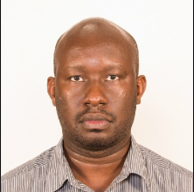
Mr. Morris NDEMWA
Lead Data Analyst
Morris NDEMWA is a Research Scientist at the Kenya Medical Research Institute – Nagasaki University Institute of Tropical Medicine, Kenya (KEMRI-NUITM). He is currently pursuing a PhD in Medical Epidemiology from Nagasaki University, Japan with a focusing on population dynamics using time series analysis. He has more than 11 years of epidemiological experience with research interest in digital epidemiology, and public health. Currently, he is working on projects operated by KEMRI-NUITM including; Health and Demographic Surveillance Systems (Mbita and Kwale), A Birth Cohort study looking at factors that influence health of children under five years emphasising on potential risks for malnutrition and mortality in Kwale. Additionally, he is working on a project which its main focus is to study health and quality of life for the elderly in Kwale.
Academic & Professional Qualifications
Academic Qualifications
- PhD Epidemiology- Nagasaki University, Japan
- MSc. Epidemiology – Jomo Kenyatta University of Agriculture and Technology
- BSc. Biotechnology – Kenyatta University
Professional
- International Network of field sites with continuous Demographic Evaluation of Population and Their Health (INDEPTH Network)
- Institute for Health Metrics and Evaluation (IHME)
Academic & Professional Qualifications
- Betty Muriithi, Simon Karanja, Mohamed Karama, Collins Okoyo, Morris Ndemwa, Yoshio Ichinose and Satoshi Kaneko Occurrence of Acute Respiratory Tract Infectionsamong Children Under Five Years Attending Kinango Subcounty Hospital, Kenya. (View Publication)
- H Hassan, S Guyo, M Ndemwa, M Karama, P Mwaniki, Health effects and association of demographic characteristics with Khat chewing for residents between 18 – 50 years in Moyale Sub-County, Kenya. (View Publication)
- Satoshi Kaneko and Morris Ndemwa Importance of Appropriate and Reliable Population Data in Developing Regions to understand Epidemiology of Diseases. In: WatanabeT., WatanabeC. (eds) Health in Ecological Perspectives in the Anthropocene. Springer, Singapore (View Publication)
- M Ndemwa, S Wanyua, S Kaneko, M Karama, M Anselimo Nutritional Status and Association of Demographic Characteristics with Malnutrition among children less than 24 months in Kwale county, Kenya. Panafrican Medical Journal 2017; 28:265
- S Wanyua, S Kaneko, M Karama, A Makokha, M Ndemwa, A Kisule, M Changoma, K Goto, M Shimada Roles of Traditional Birth Attendants and Perceptions on the Policy Discouraging Home Delivery in Coastal Kenya.East African Medical Journal Vol 91 No 3 2014:
- Sheru Wanyua, Morris Ndemwa, Kensuke Goto, Junichi Tanaka, James K’Opiyo, Silas Okumu, Paul Diela, Satoshi Kaneko, Mohamed Karama, Yoshio Ichinose and Masaaki Shimada Profile: The Mbita Health and Demographic Surveillance System international journal of epidemiology 2013;42:1678-1685:

Mr. Gabriel Miring’u M
Laboratory Technologist
Mr. Gabriel has an academic background in Medical laboratory Sciences, Registered by KMLTTB. His current field of practice is Clinical Research, mostly in Diarrheal and Septicemia related diseases. He has gained a lot of experience in Good Clinical Laboratory Practices mostly though working and training in BSL3 facility, where he is in charge.
Academic & Professional Qualifications
- MSc- Infectious Disease-ongoing
- BSc – Medical Laboratory Sciences
Selected Publications
- Evolution of V. cholerae O1 biotypes responsible for cholera outbreaks in Kenya between 1975 and 2017. Microbiology and Immunology. 2019;63:350–358. (View Publication)
- Genomic characterization of uncommon human G3P[6] rotavirus strains that have emerged in Kenya after rotavirus vaccine introduction, and prevaccine human G8P[4] rotavirus strains. Infection, Genetics and Evolution. 2019; 68:231–248. (View Publication)
- Impact of rotavirus vaccination on rotavirus hospitalization rates among a resource-limited rural population in Mbita, Western Kenya. Tropical Medicine & International Health. 2018 (View Publication)
- Biosafety and biosecurity capacity building: insights from implementation of the NUITM-KEMRI training model. Trop Med Health. 2018. (View Publication)
- Knowledge and Practices Regarding Usage of Biological Safety Cabinets (View Publication)
- An Outbreak of Diarrhea in Mandera, Kenya, Due to Escherichia coli Serogroup O-Nontypable Strain That Had a Coding Gene for Enteroaggregative E. coli Heat-Stable Enterotoxin (View Publication)
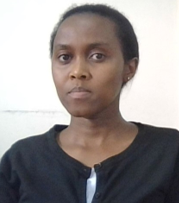
Ms. Betty Kathomi Muriithi
Research Assistant
Betty is a research assistant at Nagasaki University Institute of Tropical Medicine-Kenya Medical Training Institute (NUITM-KEMRI) Project. She is currently supporting implementation of a demographic surveillance system and a study on diagnostic aspect of Tuberculosis. She was previously attached to the bacteriology team where she supported biosafety components.
Betty is interested in maternal and child health. Her current research focus is on improvement of maternal and newborn health through integration of innovative approaches.
Academic & Professional Qualifications
Academic:
- Master of Science in Epidemiology-c; Jomo Kenyatta University of Science and Technology
- Bachelor of Science (Biochemistry); Moi University
Professional:
- Biosafety level 3 trainer; NUITM-KEMRI Project
Selected Publications
- Muriithi, B., Karanja, S., Karama, M., Okoyo, C., Ndemwa, M., Ichinose, Y. & Kaneko, S. Occurrence of Acute Respiratory Tract Infections among Children Under Five Years Attending Kinango Sub-County Hospital, Kenya. Austin J Public Health Epidemiol., 8(3): 1105. (View Publication)
- Muriithi, B., Bundi, M., Galata, A., Miring’u, G., Wandera, E., Kathiiko, C., Odoyo, E., Kememba, M., Amukoye, E., Huqa, S., Shah, M., Inoue, S. & Ichinose, Y. (2018). Biosafety and biosecurity capacity building: insights from implementation of the NUITM-KEMRI biosafety training model. Tropical medicine and health, 46:30. (View Publication)
- Miring’u, G., Bundi, M., Muriithi, B., Wandera, E., Galata, A., Kathiiko, C., Odoyo, E., Huka, S., Ogumbo, O., Ouko, J., Karama, M., Shah, M., Inoue, S. & Ichinose, Y. (2017). Knowledge and practices regarding usage of biological safety cabinets. Applied biosafety, 1-6. (View Publication)
- Bundi, M., Miring’u, G., Inoue, S, Muriithi, B., Ashur, S., Wandera, E., Kathiiko, C., Odoyo., Narita, C., Kwalla., Galata, A., Makumi, A., Huka, S., Karama, M., Shimada, M., Kariuki, S., Horio, M., & Ichinose, Y. (2014). BSL-3 laboratory user training program at NUITM-KEMRI. Tropical Medicine and Health, 42(4):171-6. (View Publication)
- Ichinose, Y., Inoue, S., Shimada, M., Miring’u, G., Muriithi, B., Makumi, A., Wandera, E., Bundi, M., Narita, C., Ashur, S., Kwalla, A., Galata, A., Odoyo, E., Huqa, S., Shah, M., Karama, M. & Horio, M. (2013). ‘Operations at Biosafety Level III: The P3 Laboratory’ in. Epidemiology II – Theory, Research and Practice. Hong-Kong; iConcept Press.
- Inoue, S., Bundi, M., Miring’u, G., Muriithi, B., Galata, A., Kathiiko, C., Odoyo, E., Huka, S., Ashur, S., Wandera, E., Kwallah, A., Shah, M., Karama, M., Kariuki, S. & Ichinose, Y. (2015). Evaluation of a BSL-3 laboratory biosafety training program in Kenya. Journal of Biotechnology and Biosafety, 3(4): 288-296. (View Publication)
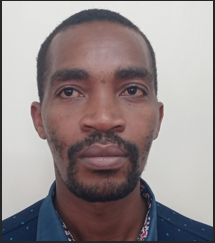
Mr. Cyrus Kathiiko Njogu
Research Assistant
Mr. Kathiiko is a dedicated, analytical-minded professional with over 6 years of experience performing laboratory investigation with precision and accuracy. He is highly skilled in operating equipment and chemicals used in specific tests.
Mr. Kathiiko is well versed in specimen analysis and instrument maintenance, ability to follow regular procedures and help prepare samples for testing. His desire is to work within a challenging and rewarding environment, which will give him an opportunity to utilize his acquired skills, apply his academic knowledge that leads to both personal and organizational growth
Academic & Professional Qualifications
- Master of Science in Infectious Disease Diagnosis
- Bachelor of Science in Medical Laboratory Sciences
- Diploma in medical Laboratory sciences
Selected Publications
- Characterization of Vibrio cholerae isolates responsible for cholera outbreaks in Kenya between 1975 and 2017 (View Publication)
- Genomic characterization of uncommon human G3P6 rotavirus strains that have emerged in Kenya after rotavirus vaccine introduction and pre-vaccine human G8P4 rotavirus strains (View Publication)
- Biosafety and biosecurity capacity building Insights from implementation of the NUITM-KEMRI biosafety training model (View Publication)
- Impact of rotavirus vaccination on rotavirus hospitalization rates among a resource limited rural population in Mbita Western Kenya (View Publication)
- Burden of rotavirus and enteric bacterial pathogens among children under five years old hospitalized with diarrhea in suburban and rural areas in Kenya (View Publication)
- An Outbreak of Diarrhea in Mandera Kenya Due to Escherichia coli Serogroup O Nontypable Strain That Had a Coding Gene for Enteroaggregative E coli Heat-Stable Enterotoxin 1 (View Publication)
